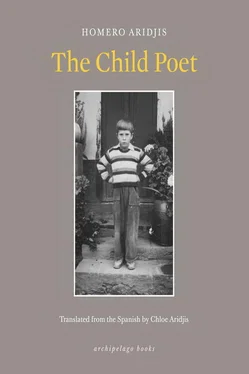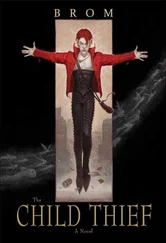“Go home,” my mother would say to me at the store, “because Ricardo el Negro is on his way, and I want you to keep an eye on him.” And to my father she’d add, “Lola’s brother came to complain because each time Ricardo el Negro goes to our house he pesters her.”
My father, concerned, would answer, “Let him stay here, I’ll go.”
And he’d go home to find Ricardo in the kitchen, sitting with Lola on his lap, her tits in his hands.
Every now and then at our store a drunkard pulled out a gun, pointed it at my father, and insulted the customers who were buying things.
The sons-of-bitches flew right and left, verbal vomit the drunken man couldn’t keep in, spilling from his insides in a drool of clumsily articulated sounds. His finger on the trigger, he aimed at one person and then another, advertising his presence in an angry voice, his face twisted with hate, dragging himself over to my father, who said, “Go home, you’re drunk.” But the fury of his monologue unabated, the drunkard flung a bottle to the floor, dashing it to pieces, like a sentence exploding in everyone’s face. After a few minutes, however, he tucked his gun under his belt, asked for a pack of cigarettes on credit and a loan of ten pesos, and left.
And when foulmouthed boys at school engaged in a dialogue of obscenities during recess, in the form of off-color puns or insults all round, I could feel the filth from their tongues besmirching every limb, word, or person they mentioned.
It was almost physically impossible for me to say bad words; my tongue refused to pronounce them, and to do so seemed as violent an act as smashing a glass in someone’s face, for it meant breaking an object at the same time as hurting a person, and soiling myself in the process. But the truth was, I had no talent for them, and I’d forget the words as soon as I heard them or, better said, I’d bury them within my very depths as if they were slimy leviathans. As for my father, at the height of his wrath he could barely bring himself to utter a “damn.”
The cemetery lay beside a field belonging to my father. Its whitewashed wall, built from alternating stone and brick, rose around it like a supernatural barrier separating life from death.
Whenever I visited the field, walking among the magueys, I would think about my dead sisters and about the other dead. I wondered how many souls of the deceased, from all ages and all countries, there would be now, and whether there were more dead souls than living people. I thought I could see my sisters, who died before I was born, up in the sky. And so strongly did I feel their existence, spread across the blue like a spiritual ether, that sometimes a word or gesture of mine seemed inspired by them. I never knew them; I’d only seen them in photos, tiny and naked, a few weeks before their deaths, still looking as if they’d just arrived from elsewhere, radiating a strange happiness. My parents kept these photographs alongside their dresses and knitted booties, and when we had guests over they would bring them out, to illustrate the tale of the dead daughters. Alone in my room, I sometimes thought I could sense their presence, without fear and with love, for they were my sisters. And on overcast afternoons, when melancholy led me to sit beneath the fig tree or wander about the poultry yard, something in me began to sense they were nearby. But I couldn’t see them, for if someone sees a dead person he can no longer live in the world of men; he has entered into the other one, the world of ghosts. Yet every man carries his ghost, latent, within him.
The baa of the lamb tied to a pole in the backyard filled me with the queasiness triggered by the sight of animals one knows are awaiting their death. Still very young, with budding horns, he ran around the pole, or stood still, staring at the ground with unseeing eyes; every now and then he emitted a prolonged baa , whose very sound was painful to me. When I heard it I went to hug him, seized by an immense affection brought on by his body and his bleat. But I’d stop and stand by his side, running my hand through his wool and over his hard head. He seemed to be addressing me with his baas , and didn’t appear to eat anything, for the same withered grass rose between his feet.
For a few days, when I visited the backyard I knew he would be there, standing beneath the sun that warmed his wool, amid the sparse shadows of the pear and fig trees.
Until one morning he wasn’t there, and I found out that a butcher had taken him away to turn him into barbacoa for a luncheon we were having the following day.
I went to my father, wanting him to intercede on the lamb’s behalf, but was told he’d been slaughtered at dawn.
And so they served him to us, at a meal my parents hosted for a storekeeper visiting from Mexico City. With a chunk of leg on my plate, I suffered to see the lamb I’d been so fond of changed into steamed meat, hearing deep down inside me his heartbreaking baa as a kind of reproach.
This visual grieving for his death prevented me from taking a single bite, as I sensed his body in its mutilated form and I was filled with a growing desire to piece him together again and return him to the pasture to graze. The general enjoyment and the maids’ sporadic laughter as they served him up, the methodical words of the storekeeper, who referred to him as food and went on about other ways to cook him — all this offended me.
I couldn’t help getting the shivers when I felt tempted to eat the lamb I’d loved alive, my hunger entangled with his smell, and was on the verge of eating him along with the others; then I reminded myself that for me he was not only a piece of meat on a plate but also his eyes, his baas , his existence.
So I said I didn’t feel well and would only have soup, cheese, and a glass of orange juice, overwhelmed by the sadness that the death of animals aroused in me, experiencing the same disquiet as whenever I saw the maid snapping the neck of a rabbit or chicken as if she were simply twisting a rope, then placing it, inert, on the table, almost immediately after the final spasm, to be later skinned or plucked.
The freeloaders would show up while we were eating. After learning from the butcher that there was mole in the house, my uncle Carlos would appear as though drawn by the smell of the food, asking for me since he was on the outs with my parents, with whom he no longer spoke and would greet with a stiff nod of the head. He’d sit down at the table, listening attentively to the conversation, waited on by a maid. Almost immediately afterwards, don Raimundo would arrive. Waddling in like a fat pigeon, he would thrust his plump arms behind him as if they were plucked wings. He was the village tax collector, and diving into the food, he didn’t appear to see any of us watching him, nor hear us talking, so absorbed was he in stuffing himself. Don Raimundo and my uncle Carlos were not on speaking terms either; I think they even pretended not to notice each other’s presence at the table. Yet my uncle, ill-tempered and sarcastic and, at the end of the day, knowing he was my mother’s cousin, would sometimes fling a mocking remark in don Raimundo’s direction, such as, “Slow down, the mole isn’t going to run away,” or else, “Sit down and take a rest,” don Raimundo of course already being seated.
But my uncle spent fifty weeks a year being angry at my parents, and only two, spread out in days over the months, on good terms with them. My parents could never figure out, however, despite all their guessing, why he was angry; they could only assume that the sole and constant reason might be envy, for it profoundly disturbed him that my father was better off than he was. On the other hand, he was accustomed to carrying his envy around as if it were a chronic disease from which deep down he derived a certain pleasure, or using it as a justification for his intolerably bad manners. Nevertheless, each time there was a special occasion at home, he would appear uninvited, like a dog with his tail between his legs, as they say. But even more than my uncle Carlos it was don Raimundo who went after food like a dog regardless of who was providing it, be they friends or enemies, ignoring rebukes and insinuations. He barged in on any meal and sat himself down among the unwelcoming diners, digging his hands into whatever he could, literally grabbing everything within reach. Sometimes he was thrown out of a house with shoves and insults by a host who was either irascible or too poor to seat an undesirable guest among his family members. Short and tubby, he seemed to flaunt in his fleshy face his ravenous stomach and buttocks.
Читать дальше












